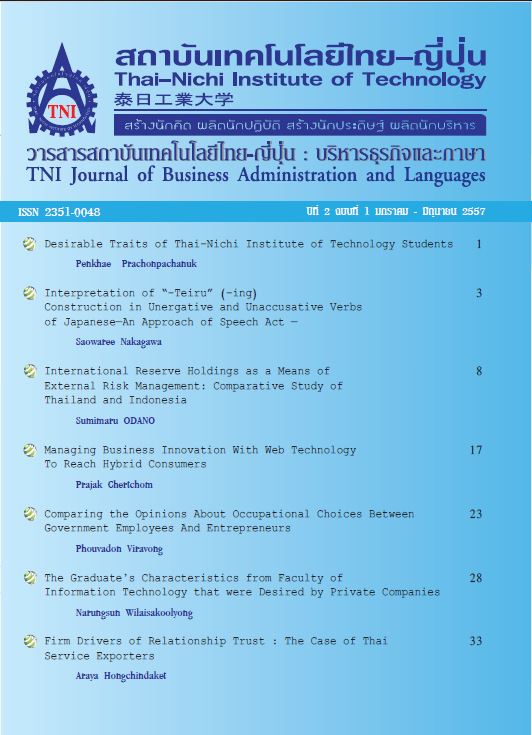Interpretation of “-Teiru”(-ing) Construction in Unergative and Unaccusative Verbs of Japanese -An Approach of Speech Act-
Main Article Content
Abstract
“-Teiru”(-ing) Construction can express an action in progress or a resulting state. Hirakawa (2003) states that “-Teiru” with an unergative (a volitional verb) obtains progressive reading and an unaccusative (a non-volitional verb) obtains a resultative reading. However, dekakeru ‘go out’ in Haha wa dekakete imasu.‘Mother is out.’ is unergative but expresses a resulting state, and fuku ‘blow’ in Kaze ga fuite iru.‘The wind is blowing.’ is unaccusative but is a progressive action. This study proposes a framework with the approach of speech act for the interpretation of “-Teiru Construction in unergatives and unaccusatives in Japanese. The findings are : 1) Momentary verbs include unergatives and unaccusatives express resulting state as in (4) and (2) but in certain contexts they express other meanings. 2) Unaccusatives showing movement as in (4) express actions in progress. 3) A context is an essential factor for the interpretation of “ –Teiru” Construction: Syntactic Context such as don don in (3) and Discourse Context such an observation of a situation in (20b) (an unaccusative, progressive). In conclusion, in the interpretation of the meanings of an action in progress and a resultative state of Japanese verbs the framework should include: i) The investigation of meanings both in Unergatives and Unaccusatives Verbs. ii) Classification of verbs in each category in i), iii) Contexts are essential for the interpretation and iv) The two meanings of “-Teiru” Construction are interpreted at the time of speaking.
Article Details
Article Accepting Policy
The editorial board of Thai-Nichi Institute of Technology is pleased to receive articles from lecturers and experts in the fields of business administration, languages, engineering and technology written in Thai or English. The academic work submitted for publication must not be published in any other publication before and must not be under consideration of other journal submissions. Therefore, those interested in participating in the dissemination of work and knowledge can submit their article to the editorial board for further submission to the screening committee to consider publishing in the journal. The articles that can be published include solely research articles. Interested persons can prepare their articles by reviewing recommendations for article authors.
Copyright infringement is solely the responsibility of the author(s) of the article. Articles that have been published must be screened and reviewed for quality from qualified experts approved by the editorial board.
The text that appears within each article published in this research journal is a personal opinion of each author, nothing related to Thai-Nichi Institute of Technology, and other faculty members in the institution in any way. Responsibilities and accuracy for the content of each article are owned by each author. If there is any mistake, each author will be responsible for his/her own article(s).
The editorial board reserves the right not to bring any content, views or comments of articles in the Journal of Thai-Nichi Institute of Technology to publish before receiving permission from the authorized author(s) in writing. The published work is the copyright of the Journal of Thai-Nichi Institute of Technology.
References
Hirakawa, M. 2003. Unaccusativity in Second Language Japanese and English. Hituzi Syobo
Kindaichi, H. 1950, 1976. Nihongo Doshi no Asupekuto. Kokugo doshi no Ichi Bunrui Mugi Syobo pp.7-61
Kudo, M. 2009. Asupekuto Tensutaikei to Tekusuto. Hituzi Syobo, pp.5-100
Kuno, S. 2006 A Functional Approach to Japanese Syntax.Teiru Kobun Taishukan Shoten pp.101-153
Perlmutter, D. 1978, Impersonal Passives and the Unaccusative Hypothesis BLS 4, pp. 157-189
Vendler, Z. 1967 Linguistics in Philosophy. Ithaca: Conell University Press pp.97-121
Nakagawa, S 2012, Seikatsu Komyunikeishongakuj Vol. 3, Suzuka College, Japan, A Comparative Study of ~te iru in Japanese and BE-ing in English pp.23-34


